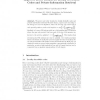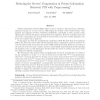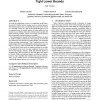72 search results - page 1 / 15 » A tight lower bound for restricted pir protocols |
CC
2006
Springer
13 years 4 months ago
2006
Springer
We show that any 1-round 2-server Private Information Retrieval Protocol where the answers are 1-bit long must ask questions that are at least n - 2 bits long, which is nearly equa...
ICALP
2005
Springer
13 years 10 months ago
2005
Springer
We prove new lower bounds for locally decodable codes and private information retrieval. We show that a 2-query LDC encoding nbit strings over an ℓ-bit alphabet, where the decode...
CRYPTO
2000
Springer
13 years 9 months ago
2000
Springer
Private information retrieval (PIR) enables a user to retrieve a data item from a database, replicated among one or more servers, while hiding the identity of the retrieved item. ...
PODS
2006
ACM
14 years 4 months ago
2006
ACM
We study the randomized version of a computation model (introduced in [9, 10]) that restricts random access to external memory and internal memory space. Essentially, this model c...
STOC
2012
ACM
11 years 7 months ago
2012
ACM
We consider the file maintenance problem (also called the online labeling problem) in which n integer items from the set {1, . . . , r} are to be stored in an array of size m ≥...



